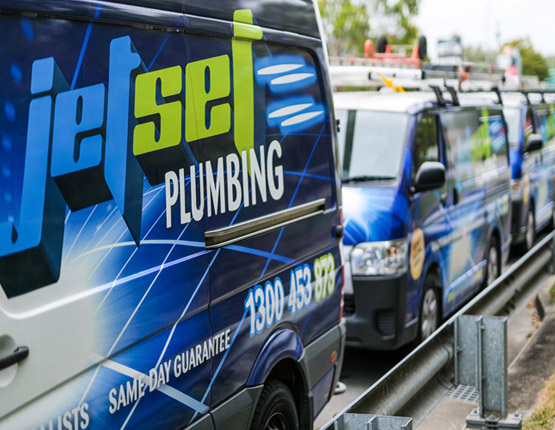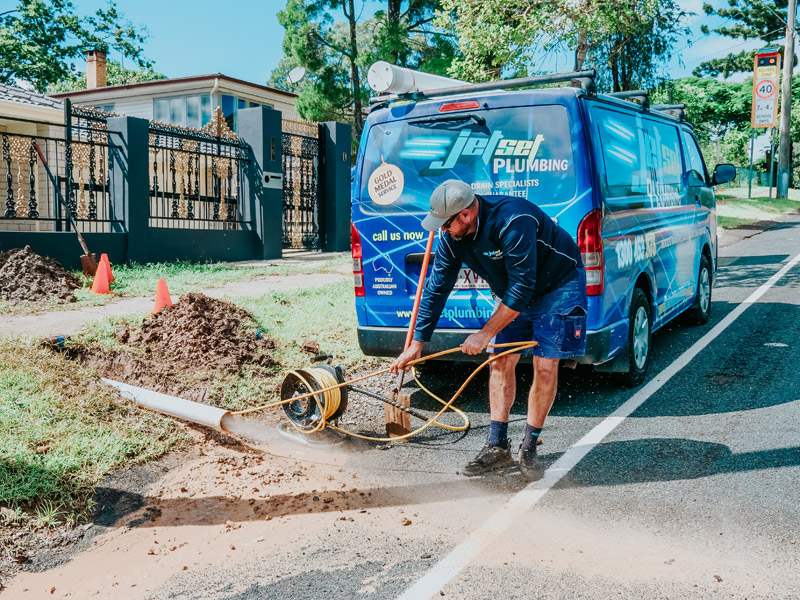
Not only are blocked drains a huge inconvenience when washing dishes at the kitchen sink or in the bathroom, but the longer you leave it untreated, the more severe the issue becomes, possibly causing major damage to your plumbing system and your property.
Here are some actions to take and tools to use when dealing with a blocked drain. While these may temporarily solve your drainage problem, if the obstruction is significant enough, you will need to contact a professional plumber to have it properly fixed.
The highly trained plumbers at Jetset Plumbing can handle all your blocked drain issues. Call our office on 1800 443 996 and our friendly team will send out a plumber to unclog your drain fast.
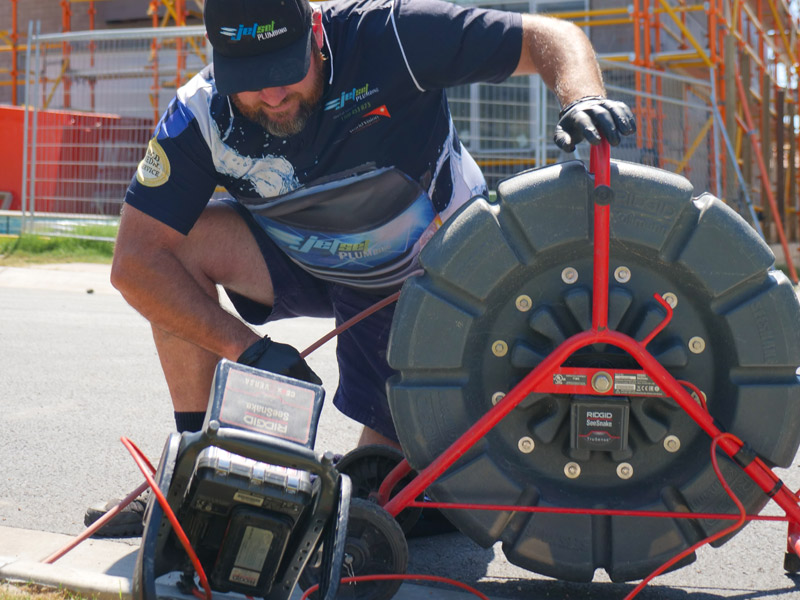
An obvious of a blocked drain is a drain that won't drain away water or does so slowly.
If you hear a gurgling or other strange noises coming from your drains, it may indicate that water isn't flowing freely down the pipes.
A bad odour is one of the most distressing signs of a blocked drain. If you smell sewage or another bad smell in your kitchen or bathroom, it could mean that food waste, toiletries, or other debris have become lodged in the pipes, causing a blockage.
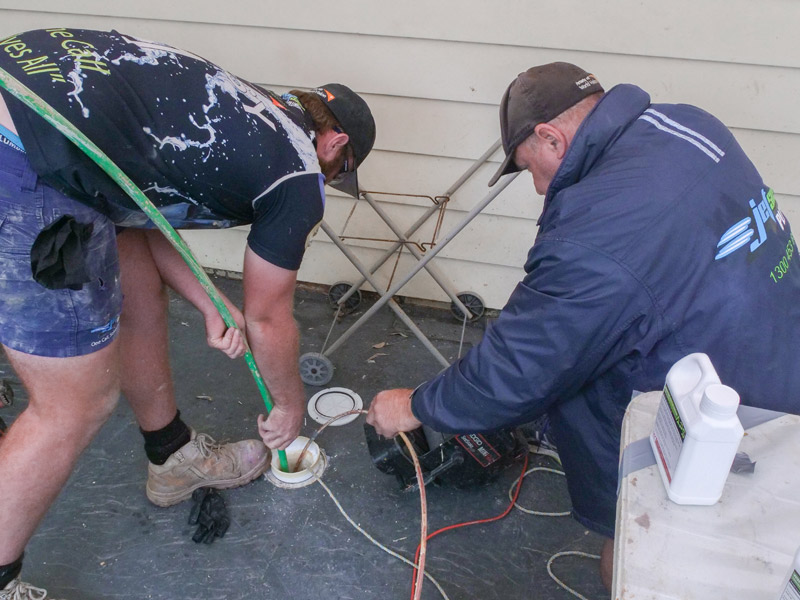
The plunger is a home necessity for unclogging clogged toilets and drains. We recommend keeping a small plunger on hand to unblock minor clogs for the kitchen sink, bathroom basin, and toilet.
Although the plunger is often helpful for small blockages, it is more suited to remove a solid mass but is rather ineffective on a build-up of oil and fatty substances.
Make sure the rubber seal is evenly applied around the drain so that pressure will build up when you begin using the plunger.
If the blockage is in a double-basin sink, place the plunger seal over the unclogged drain. This forces the water to flow to the affected side.
You can create your own drain cleaner combination with a few common household ingredients rather than racing to the store to buy one. When baking soda and white vinegar are combined, an expanding acid-base reaction is produced that can help in clearing debris.
Pour one cup of baking soda down the drain and let it sit for a few minutes before adding one cup of vinegar and another cup of hot water.
Put a plug over the drain to keep it from overflowing. Wait around 10 minutes for the things to react and fizzle before running hot water down the drain to rinse away the residue.
To quickly target blockages, caustic drain products typically use sodium hydroxide and other chemicals.
Caustic cleaners can be extremely corrosive and damaging to the environment, so use them with caution. The other type of cleaner is enzyme-based, which takes longer to work but is considerably safer for the environment.
The efficacy of these products is still being debated. We personally don't advocate drain cleaning products because we've never seen them perform well. Not to mention the dangers they pose to both humans and the environment.
If you decide to use a drain cleaner, carefully read the label to see what chemicals it includes. Wear protective gloves when applying the product and store it carefully away from children and pets after use.
Make sure not to combine or mix these with any other cleaning products as this may cause an undesirable and possibly deadly reaction.
A hair build-up is often the easiest to remove as compared to many other common causes of a blocked drain. When it comes to extracting hair from a clogged drain, gloves, and a hand small enough to fit down the drain may be all that is required.
Another popular method is to straighten out a wire coat hanger while keeping one end curled and dropping it into the drain to fork out the hair. This is particularly effective in the shower.
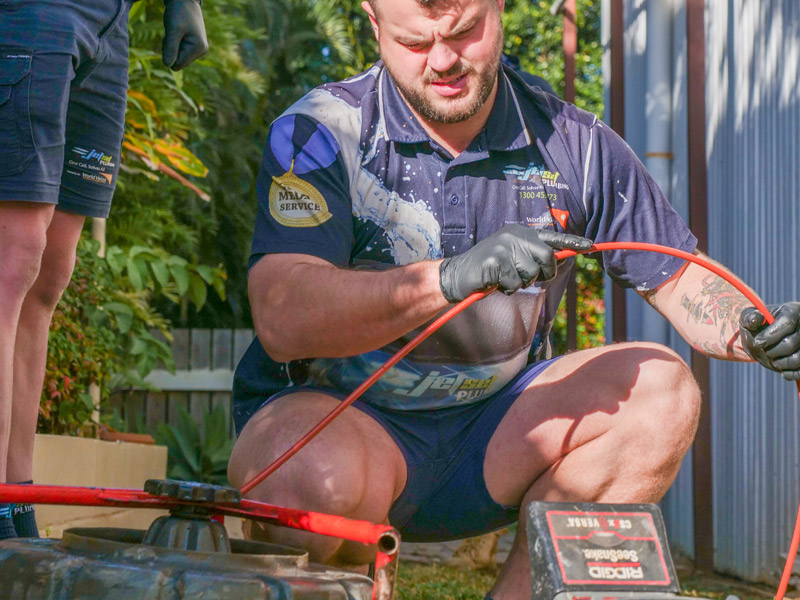
Hair amassing in the pipes is a major culprit of clogged drains. Human and pet hair can easily make its way past the drain in showers and sinks. Hair tangles and other debris become stuck in the mass once it enters the pipes.
Wet wipes and feminine hygiene items are common causes of a blocked drain. Because they don't dissolve as toilet paper does, even the usage of so-called flushable wipes can result in a blocked toilet.
Wasted food is another factor. Sink strainers are frequently used to trap little food fragments that can fall to the bottom of the kitchen sink.
However, some food waste may inevitably slip through, and if it is difficult to decompose, problems may result. Particularly resilient food waste are coffee and tea grinds.
Congealed fats and oils can also contribute to kitchen sink blockage. These substances can harden further in the drain after entering it, which can lead to other food debris getting stuck as well. Pouring oils down the sink is never a good idea because of this.
What's lying beneath your house also plays a role. Tree and large shrub roots may be a nightmare for your plumbing system, breaking through pipes by forcing their way into existing gaps or joins and producing serious obstructions.
Tree roots are especially common in damaged PVC (elbow) joints and ancient ceramic pipework.
To identify the best course of action, a skilled plumber must analyse the problem. In extreme circumstances, damaged pipelines and trees may need to be replaced.
External drain obstructions can also be caused by the build-up of leaves, mud, and garden waste. Ensure that your drain has an intact grill and that the surrounding region is periodically cleared of outdoor debris.
To prevent your sinks from getting clogged use a drain strainer to catch any food waste before it goes down the drain. Also, keep in mind to regularly dispose of everything the strainer catches. Additionally, refrain from dumping things like oils down the sink.
Before it slides and lodges further down the pipe and gets more challenging to reach, clear any buildup of hair from the basin, bathtub, or shower waste in the bathroom.
If you have a persistent and reoccurring clog, call the team at Jetset Plumbing and we'll send a qualified plumber to take care of your blocked drain.
